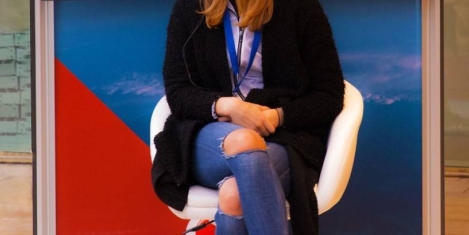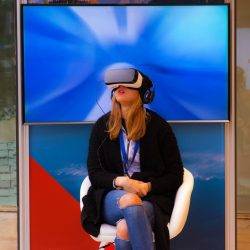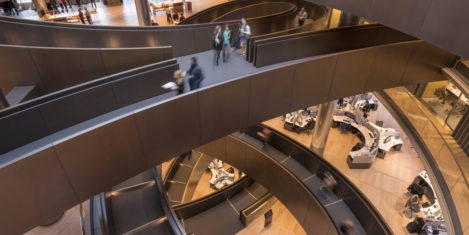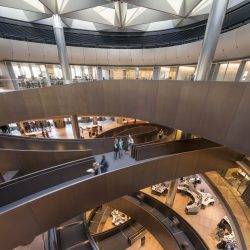October 10, 2018
The Genesis of ideation and the places we go to have our best ideas 0
 Because collaboration, creativity and innovation are increasingly perceived as key objectives and differentiators of performance, the genesis and mechanisms behind ideation and creativity are an an integral part of both business and personal development. As a consequence, there is growing interest in the way the physical attributes of work settings may influence or even trigger creative behaviour. The cliché of the shower as one of these favourite places comes to mind and yet experience does show that the idea of seeking a setting, a “zone” if you will, for a specific purpose is intuitively right. This needn’t be a retreat or cocoon, as is often assumed, but can also be a crowded, busy, noisy place, which might explain why so often the most animated work conversations move out of the office shop into the coffee shop. Equally, highlight events or special meetings tend to be held in a “venue’, often dressed for the occasion.
Because collaboration, creativity and innovation are increasingly perceived as key objectives and differentiators of performance, the genesis and mechanisms behind ideation and creativity are an an integral part of both business and personal development. As a consequence, there is growing interest in the way the physical attributes of work settings may influence or even trigger creative behaviour. The cliché of the shower as one of these favourite places comes to mind and yet experience does show that the idea of seeking a setting, a “zone” if you will, for a specific purpose is intuitively right. This needn’t be a retreat or cocoon, as is often assumed, but can also be a crowded, busy, noisy place, which might explain why so often the most animated work conversations move out of the office shop into the coffee shop. Equally, highlight events or special meetings tend to be held in a “venue’, often dressed for the occasion.






 Today is World Mental Health Day and new research from Bupa has found that concerns over mental health is not confined to adults, as a third of employees say they worry about their children’s mental health while at work. The research, conducted among working parents of 4-18 year olds reveals that children’s mental health is among parents’ greatest concerns, on par with physical health and academic performance. The only concern that ranks higher is future financial prospects.
Today is World Mental Health Day and new research from Bupa has found that concerns over mental health is not confined to adults, as a third of employees say they worry about their children’s mental health while at work. The research, conducted among working parents of 4-18 year olds reveals that children’s mental health is among parents’ greatest concerns, on par with physical health and academic performance. The only concern that ranks higher is future financial prospects. 
 The majority of employees (77 percent) agree that people should take proactive steps to manage their mental health a new survey has revealed. Of those surveyed, the vast majority felt that there is increased awareness about mental health (87 percent) and that people are more willing to talk openly about mental health issues than they were a few years ago (82 percent). The impact of high-profile people speaking out about their own mental health challenges was believed to be the biggest influencing factor, cited by more than half (53 percent) of respondents.
The majority of employees (77 percent) agree that people should take proactive steps to manage their mental health a new survey has revealed. Of those surveyed, the vast majority felt that there is increased awareness about mental health (87 percent) and that people are more willing to talk openly about mental health issues than they were a few years ago (82 percent). The impact of high-profile people speaking out about their own mental health challenges was believed to be the biggest influencing factor, cited by more than half (53 percent) of respondents. 
 More than half of CEOs (53 percent) admit they can’t find candidates with the necessary skills to help them navigate an increasingly digitalised business landscape a new survey from Robert Half has claimed. These include data analysis and digital skills, as well as softer skills such as resilience, adaptability to change and critical thinking. This means that nearly five million UK SMEs, the equivalent to four out of every five (82 percent) small and medium-sized companies, are struggling to attract the skills they need. As a result, many are being forced to offer salary packages higher than originally expected to recruit the right talent.
More than half of CEOs (53 percent) admit they can’t find candidates with the necessary skills to help them navigate an increasingly digitalised business landscape a new survey from Robert Half has claimed. These include data analysis and digital skills, as well as softer skills such as resilience, adaptability to change and critical thinking. This means that nearly five million UK SMEs, the equivalent to four out of every five (82 percent) small and medium-sized companies, are struggling to attract the skills they need. As a result, many are being forced to offer salary packages higher than originally expected to recruit the right talent. 










 National Work Life Week (1st – 5th October 2018) starts today with the aim of encouraging companies to think about their employees’ wellbeing and happiness. To mark the week new research asked British workers about the things they most want from their work. The YouGov survey of 2,000 adults, commissioned by the Oxford Open Learning Trust, found that while money is predictably the biggest motivator behind career choice (64 percent), over half of the respondents cited working hours and flexible working as an important factor (55 percent).
National Work Life Week (1st – 5th October 2018) starts today with the aim of encouraging companies to think about their employees’ wellbeing and happiness. To mark the week new research asked British workers about the things they most want from their work. The YouGov survey of 2,000 adults, commissioned by the Oxford Open Learning Trust, found that while money is predictably the biggest motivator behind career choice (64 percent), over half of the respondents cited working hours and flexible working as an important factor (55 percent). 











October 5, 2018
Developing a resilient mindset to cope with stress
by Portia Hickey • Comment, Wellbeing
More →